翻译lecture six
Lecture six sentence writing英语句子写作
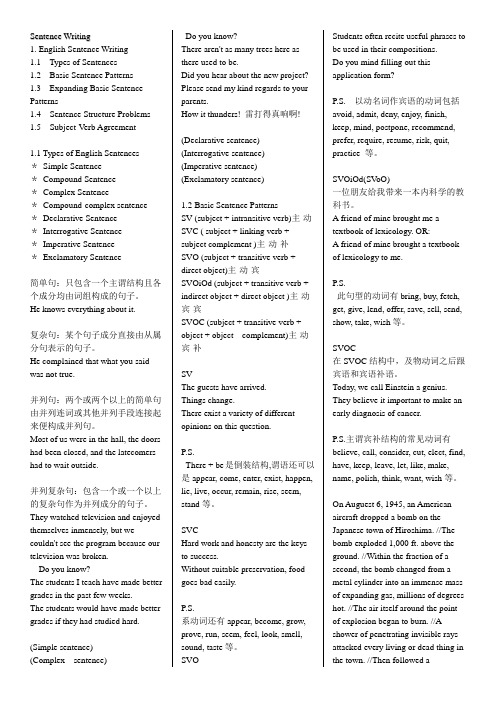
S e n t e n c e W r i t i n g1. English Sentence Writing1.1 Types of Sentences1.2 Basic Sentence Patterns1.3 Expanding Basic Sentence Patterns1.4 Sentence Structure Problems 1.5 Subject-Verb Agreement1.1 Types of English Sentences*Simple Sentence*Compound Sentence*Complex Sentence*Compound-complex sentence*Declarative Sentence*Interrogative Sentence*Imperative Sentence*Exclamatory Sentence简单句:只包含一个主谓结构且各个成分均由词组构成的句子。
He knows everything about it.复杂句:某个句子成分直接由从属分句表示的句子。
He complained that what you said was not true.并列句:两个或两个以上的简单句由并列连词或其他并列手段连接起来便构成并列句。
Most of us were in the hall, the doors had been closed, and the latecomers had to wait outside.并列复杂句:包含一个或一个以上的复杂句作为并列成分的句子。
They watched television and enjoyed themselves inmensely, but we couldn't see the program because our television was broken.Do you know?The students I teach have made better grades in the past few weeks.The students would have made better grades if they had studied hard.(Simple sentence)(Complex sentence)Do you know?There aren't as many trees here asthere used to be.Did you hear about the new project?Please send my kind regards to yourparents.How it thunders! 雷打得真响啊!(Declarative sentence)(Interrogative sentence)(Imperative sentence)(Exclamatory sentence)1.2 Basic Sentence PatternsSV (subject + intransitive verb)主-动SVC ( subject + linking verb +subject complement )主-动-补SVO (subject + transitive verb +direct object)主-动-宾SVOiOd (subject + transitive verb +indirect object + direct object )主-动-宾-宾SVOC (subject + transitive verb +object + object complement)主-动-宾-补SVThe guests have arrived.Things change.There exist a variety of differentopinions on this question.P.S.There + be是倒装结构,谓语还可以是appear, come, enter, exist, happen,lie, live, occur, remain, rise, seem,stand等。
Lecture Six(10.22)

psychological basis of child’s speech speech dynamics physiological physical psychological
The process of a child’s requiring language
phenomenon understanding of facial expression’s and tones producing sounds responses of gestures and simple orders responses to the influences from practice of verbal games repeatedly ability of combination of verbal elements required from other‘s talks, but at random wholly understanding of orders using phrases to express itself fully understanding of adult’s utterances well mastering the use of utterances
First language
a person’s mother tongue or the language acquired first. In multilingual communities, however, a child may gradually shift from the main use of one language to the main use of another, first language may refer to the language the child feels most comfortable using.
Collegelectures Is Anybody Listening原文翻译
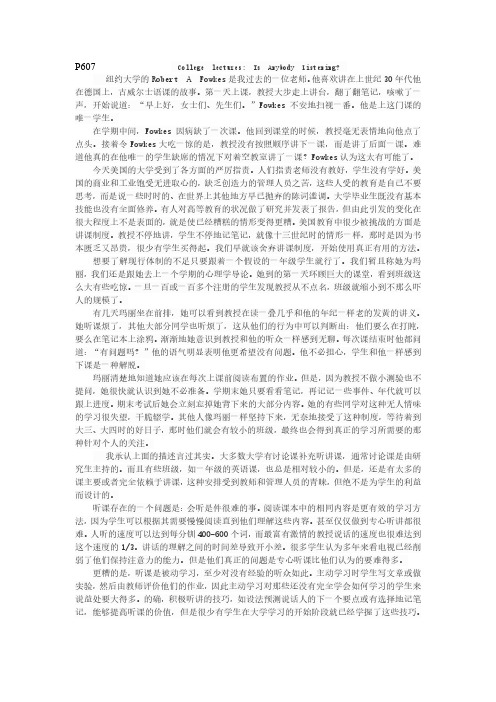
P607 College lectures: Is Anybody Listening?纽约大学的Robert A Fowkes是我过去的一位老师。
他喜欢讲在上世纪30年代他在德国上,古威尔士语课的故事。
第一天上课,教授大步走上讲台,翻了翻笔记,咳嗽了一声,开始说道:“早上好,女士们、先生们。
”Fowkes不安地扫视一番。
他是上这门课的唯一学生。
在学期中间,Fowkes因病缺了一次课。
他回到课堂的时候,教授毫无表情地向他点了点头。
接着令Fowkes大吃一惊的是,教授没有按照顺序讲下一课,而是讲了后面一课。
难道他真的在他唯一的学生缺席的情况下对着空教室讲了一课?Fowkes认为这太有可能了。
今天美国的大学受到了各方面的严厉指责。
人们指责老师没有教好,学生没有学好。
美国的商业和工业饱受无进取心的,缺乏创造力的管理人员之苦,这些人受的教育是自己不要思考,而是说一些时时的、在世界上其他地方早已抛弃的陈词滥调。
大学毕业生既没有基本技能也没有全面修养。
有人对高等教育的状况做了研究并发表了报告,但由此引发的变化在很大程度上不是表面的,就是使已经糟糕的情形变得更糟。
美国教育中很少被挑战的方面是讲课制度。
教授不停地讲,学生不停地记笔记,就像十三世纪时的情形一样,那时是因为书本匮乏又昂贵,很少有学生买得起。
我们早就该舍弃讲课制度,开始使用真正有用的方法。
想要了解现行体制的不足只要跟着一个假设的一年级学生就行了。
我们暂且称她为玛丽,我们还是跟她去上一个学期的心理学导论。
她到的第一天环顾巨大的课堂,看到班级这么大有些吃惊。
一旦一百或一百多个注册的学生发现教授从不点名,班级就缩小到不那么吓人的规模了。
有几天玛丽坐在前排,她可以看到教授在读一叠几乎和他的年纪一样老的发黄的讲义。
她听课烦了,其他大部分同学也听烦了,这从他们的行为中可以判断出:他们要么在打盹,要么在笔记本上涂鸦。
渐渐地她意识到教授和他的听众一样感到无聊。
每次课结束时他都问道:“有问题吗?”他的语气明显表明他更希望没有问题。
lecture用法最全详解(含习题)

2.lecturelecture /ˈlektʃə(r)/ 词频4n. 讲座;讲课;教训. vi. (开)讲座;讲课. vt. 训斥派:lecturer 词频2 n.演讲者;(大学)讲师①高义频vi.&n.(尤指大学中的)讲座;讲课;演讲go to/attend a lecture 听讲座deliver/give a lecture做讲座a lecture on/about 关于……的讲课/训斥e.g. He lectures on literature at Manchester University. 他在曼彻斯特大学教文学。
②低义频vi.&n.教训;训斥lecture sb. about/on...因……训斥某人give sb. a lecture 给某人一个教训e.g. He’s always lecturing me about the way I dress. 他总是对我的穿着说三道四。
e.g. I know I should stop drinking-don’t give me a lecture about it.我知道我该戒酒,别教训我了。
1.单词拼写(1)I went to the ___(讲座) he gave in the hall.(lecture)(2)He learned a ___(教训)from this thing-he should stop smoking for his health.(lecture)(3)Professor Smith will give a l___ in Fudan University this evening about the history of English.(lecture)(4)She suffered a bad cold. As a result, she missed the ___(讲座) she liked very much.(lecture)(5)She preferred that we should have the discussion right after the ___(讲座).(lecture)(6)Please stop___(lecture) me! I know I should quit smoking.2.语法填空(1)The ___ (lecture) spoke very clearly so that we could hear every word.(lecturer) 3. 完成句子(1)He ___ ___ ___ ___time management to first-year students___ ___ ___ ___.他在报告厅给一年级学生做关于时间管理的讲座。
Lecture 6 旅游翻译

常用语句翻译: 常用语句翻译:海关
May I have your name, sir/madam/miss? / What is your name? 请告诉我您的姓名,先生/女士/小姐。 May I see your passport and declaration forms please? / Show me your passport and visa, please. 请把护照和申报表给我。/请把护照和签证给我。 Do you have anything to declare? /Have you got anything to declare? 您有需要申报的物品吗? Lecture 4
常用语句翻译: 常用语句翻译:飞机广播
Ladies and gentlemen, welcome to ________ Airport. Local time is ________ and the temperature is ________. 各位乘客,欢迎到来XX机场,当地时间是XX,气温为XX。 For your safety and comfort, we ask that you please remain seated with your seat belt fastened. 为了大家的安全,请大家系好安全带,在座位上坐好。 Please check around your seat for any personal belongings you may have brought onboard with you. 请大家检查好随身物品,以免遗漏。 Lecture 4
实用英汉翻译
常用语句翻译: 常用语句翻译:飞机广播
If you require deplaning assistance, please remain in your seat until all other passengers have deplaned. One of our crew members will then be pleased to assist you. 下机时若需要帮助,请在座位上等待,让其他乘客先下,我们 的乘务员将非常高兴为您提供帮助。 On behalf of ________ Airlines and the entire crew, I’d like to thank you for joining us on this trip and we are looking forward to seeing you on board again in the near future. Have a nice day/evening/night/stay!” 我代表XX航班全体乘务人员,感谢您乘坐本次航班,期待您 再次乘坐。祝您一路顺风! Lecture 4
lecture 6 汉英句式翻译
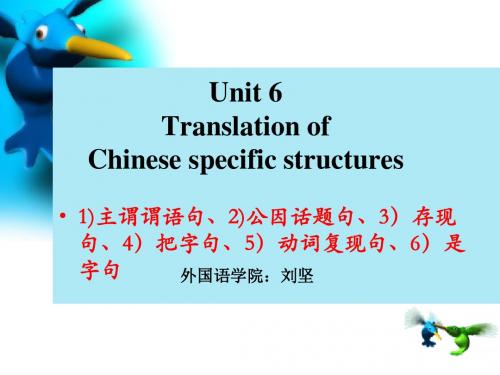
III. 存现句的翻译
• 存现句1.存现句含义 • 存现句,指的是说明某处或某时有某人物存在、出 现、消失的句子。 • 如: • ①河里漂着两只船。(存在) • ②前面来了两个客人。(出现) • ③昨天走了两个陌生人。 (消失)
• •
• • •
• 1. 有+名词+附加语(v., adj., phase etc. ) 1)译为英语存现句: 有人敲门。-There is someone knocking./ Some one is at the door. 有趟列车六点出发。-There is a train due to leave at six. 可能已有些疑点出现在他的案子中。 There could be a few doubts/suspicion in his case.
I. 主谓谓语句(sentence with a subject-predicate phrase as predicate)的翻译
(Topic-prominent structure VS Subject-prominent structure)
• 1) 大小主语是总体和部分的关系:大主语译成 定语,小主语改为句子主语 • (1) 我国的国民经济,工业和农业都是基础。 • Both industry and agriculture are the foundation of national economy in our country. • (2) 总共五个人,三个病了干不了活。 • Three of five persons in all are not able to work because of illness. • (3) 敌人活着的,全都缴械投降。 • All of the still living enemy surrendered their arms. (laid down their arms and surrendered.)
外研社《英语初级听力》第6课课文翻译

Lesson sixSection OneTapescriptDialogue 1— Is that Mr. Smith’s son? 那是Mr. Smith的儿子吗— No, it isn’t.It’s Mr. Morgan’s son. 不,那是Mr. Morgan的儿子— Is he Irish? 他是爱尔兰人吗— No, he isn’t. He is Welsh 不,他是威尔士人Dialogue 2— Where are your parents now? 你的父母现在在哪儿?— They are in Zagrepp. 他们在萨格勒布— Is that in Austria? 那是在奥地利吗?— No. It’s in Yugoslavia. 不,是在南斯拉夫Dialogue 3— Who is the girl by the door? 门边的女孩是谁?—It’s Jone Smith. 是约翰史密斯— Is she a nurse? 她是护士吗?— No. She’s a librarian. 不,她是图书管理员Dialogue 4— My hat and coat, please. Here is my ticket. 请取一下我的帽子和外套,这是我的票— Thank you, sir. Here they are. 谢谢您,先生给您— These are not mine. They are Mr. West’s.这不是我的,是Mr. West的—I’m sorry, sir. Are these yours? 非常抱歉,先生。
这是您的吗?— Yes, they are. Thank you. 是的,谢谢Dialogue 5:— Whose handbag is that? 那是谁的手提包?— Which one? 哪个?— The big leather one. 皮革的大的那个— Oh, that’s Miss Clark’s.那是Clark女士的Dialogue 6:— What are you looking at? 你在看什么?—I’m looking at some stamps. 我在看邮票— Are they interesting? 有趣吗?— Yes. They are very rare ones. 嗯,它们都非常罕见Dialogue 7:— Where's Miss Green at the moment? Green女士现在在哪儿?— In her office. 在她的办公室— What's she doing there? 她在那儿干嘛?—She’s typing. I think. 我想她正在打字。
Lecture Six
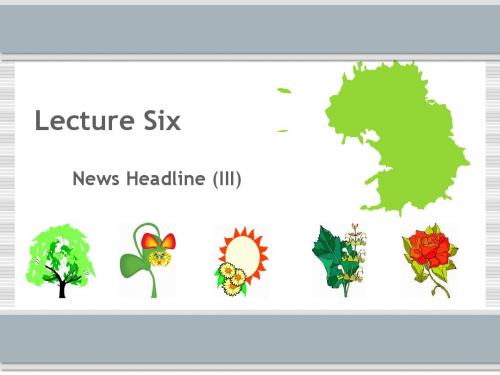
(二)无名无姓的来源
包括: 包括: 1. Official, spokesman。其前常冠以具体结构名称, 其前常冠以具体结构名称, 其前常冠以具体结构名称 如Foreign Ministry officials, Government spokesman, The White House spokesman 2. Sources (人士 official sources, a US State 人士): 人士 Department source, well-informed source, police source 3. Quarters (方面 the highest quarters, the 方面): 方面 quarters concerned, diplomatic quarters 4. Observers (观察家 experts, military experts, 观察家), 观察家 diplomatic observers
三、体现原文修辞特点
如果英语标题寓意于某种修辞手段,如双关、比喻、 如果英语标题寓意于某种修辞手段,如双关、比喻、押韵 译成汉语以后中国读者不至于产生理解上的困难, 等,译成汉语以后中国读者不至于产生理解上的困难,则 应尽可能体现原标题的修辞特色。 应尽可能体现原标题的修辞特色。如: 押韵:After The Boom Everything Is Gloom. 押韵: 繁荣不再 萧条即来。(或译 一别繁荣 一片愁容 或译: 繁荣不再,萧条即来。(或译:一别繁荣,一片愁容) 双关: 双关:Soccer Kicks Off With Violence. 足球开踢 拳打脚踢 足球开踢 拳打脚踢。 借用典故: 借用典故:Liberty Mother Of Invention. 自由是发明之母。 自由是发明之母。 幽默: 幽默:Accuser Accused. 反而成被告。 原告没当成 反而成被告。 比喻: 比喻:Middle East: A Cradle Of Terror. : 中东: 恐怖主义的摇篮。 中东 恐怖主义的摇篮。
英语国家-美国概况课件06 American Family Life
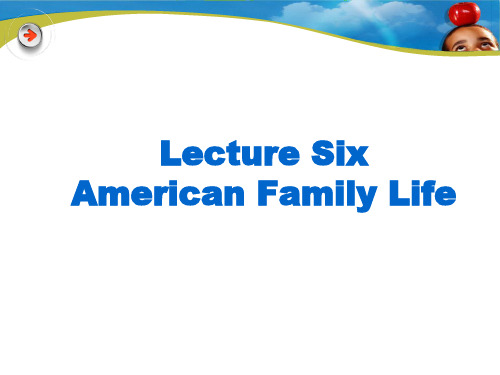
Contents
1
Warm-Up
2
Language Study
3
Detailed Study
4
Extension
Warm-Up
Discuss the Following Questions
What is a nuclear family?
Detailed Study
V. Parental roles in American family
❖ A. Family in which the children seem to be in charge
❖ 1. Some parents are reluctant and perhaps even afraid to say "no" to their children for fear of stifling their personalities or losing their love.
❖ B. Mobile homes (once called house trailers): ❖ 1. More than 7 million Americans live in mobile homes. ❖ 2. They are living quarters built with wheels. ❖ 3. They can be moved, but generally they are brought to a site that
❖ 2. Children and their possessions take over most of the house, and the youngsters make excessive demands upon their parents' time and money.
lecture的意思用法大全

lecture的意思用法大全lecture有演讲,训斥,教训的意思。
那你们想知道lecture的用法吗?今天给大家带来了lecture的用法,希望能够帮助到大家,一起来学习吧。
lecture的意思n. 演讲,训斥,教训vi. 作演讲vt. 给…作演讲,教训(通常是长篇大论的)变形:过去式: lectured; 现在分词:lecturing; 过去分词:lectured;lecture用法lecture可以用作名词lecture主要指教育性或学术性“演讲”,引申可指“冗长的训斥或谴责”。
lecture是可数名词,其后接介词on或about ,意为“关于…的演讲”“就…做演讲”“因…训斥或谴责某人”。
lecture作“讲演,讲课”解时,是不及物动词。
说“讲授某课程”时常与介词on连用,说“在某地讲演”时常与介词at〔in〕连用。
lecture用作名词的用法例句She ran over her notes before giving the lecture.她讲课前把讲稿匆匆看了一遍。
His lecture covered various aspects of language.他的讲课涉及到语言诸方面的问题。
They could not follow the lecture.他们听不懂这次演讲。
lecture可以用作动词lecture作“讲演,讲课”解时,是不及物动词。
说“讲授某课程”时常与介词on连用,说“在某地讲演”时常与介词at〔in〕连用。
lecture也可用作及物动词,意思是“向…讲演,给…讲课”,接名词或代词作宾语。
lecture还可作“责备”“教训”“训斥”解,用作及物动词,接名词或代词作宾语。
“因…而受到训斥”可说lecture sb for n./v -ing。
lecture用作动词的用法例句It was a shame for me to be lectured in front of the whole class.当着整个班级的面被训斥了一顿,真让我感到羞辱。
Lecture Six
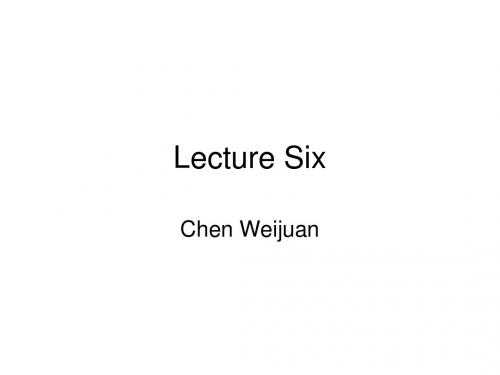
换序译法
• It’s good you’re so considerate. • 你想得这样周到是很好的。(这是很好的 你想得这样周到)。(主语从句换序)
换序译法
• From the moment they set foot on the territory of their motherland, they were warmly received by their compatriots. • 从他们走上祖国土地的时刻起,他们就受 到同胞们热情接待。(从那个时刻他们走 上。。。)(定语从句换序)
断句译法
• 自己既不肯动,他倒希望虎姑娘快快进屋去,或 是命令他干点什么,简直受不了这样的折磨,一 种什么也不像而非常难过的折磨。(老舍:《骆 驼祥子》) • He didn’t feel like moving, but wished Tigress would hurry back inside, or else give him some orders. He simply couldn’t stand this strain, which was unlike anything he had ever known, and quite unbearable.
实用文体的翻译要求
• 快捷:翻译速度是委托人或者客户的要求 之一。没有速度就没有翻译任务。
•
Changes and developments in a science are determined by numerous causes. Every science grows from its past, and the state reached in a previous generation provides the starting point for the next. But no science is carried on in a vacuum, without reference to or contact with other sciences and the general atmosphere for learning. Scientists and men of learning are also men of their age and country, and they can’t live independent of the culture. Besides its own past, the course of science is also affected by the social context of its contemporary world and the intellectual premises in it. Applications of the science and the expectations that others have of it may be a very important determinant of the direction of its growth and changes.
Lecture Six
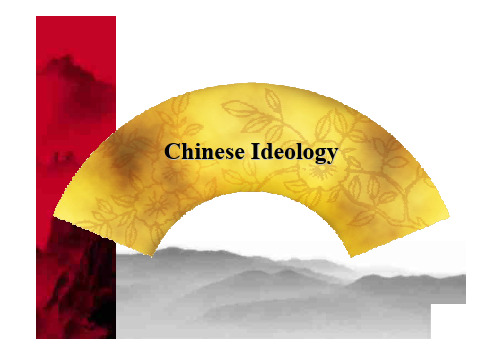
Chinese Ideology|Introduct ionChinese philosophy/ideology has developed over several thousand of years. Its origin can be traced back to the Xia, Shang, and Zhou dynasties. It began to take definite shapes during the Spring and Autumn Period and enjoyed thriving development because of the emergence of the “a hundred schools of thought contend” during the Warring States Period.|A hundred schools of thought contendThe Spring and Autumn and the Warring States Periods (770--221 BC) were a time of great social change, stimulating various schools of thought, such as Confucianism, Legalism, Taoism, and Mohism; and scholars wrote, lectured and debated vigorously, creating a lively academic environment later described as “A hundred schools of thought contend”In general, ancient Chinese philosophy progresses through the following periods: 1. The philosophy in pre-Qin Period The Development The philosophy in pre-Qin of Ancient period was marked by the Chinese emergence of various ancient Ideology philosophical views. The most influential schools were Confucianism, Taoism, Mohism and Legalism.|2. The orthodox philosophy during the Han Dynasty In the Han Dynasty, Emperor Wudi launched a campaign of “banning all schools of thought except Confucianism”. He ruled out various schools of thought and chose officials from those who were steeped (专心于) in Confucianism only. Consequently, Confucianism became an orthodox school that served as the ideological foundation of the feudal rule throughout the dynasties in China.|Orthodox philosophy advocates that Heaven affects human affairs and human behaviour finds responses in Heaven (天人感应) and the power of the emperors are authorized by Heaven (君权神授). Natural disasters are Heaven’s punishment and condemnation of human behaviour. However, human moral conduct, and political and social disorder, in turn, will effect changes in Heaven. This theory, inspired by Dong Zhongshu, is different from the Confucianism’s theory that man is an integral part of nature (天人合一).3. The Buddhist philosophy during the Sui and Tang dynasties During the Sui and Tang dynasties, Buddhism reached its peak. The Buddhist philosophy became aligned with the wisdom of Chinese philosophers. It mainly discusses the relationship between the subjective and the objective. By analysing the spiritual phenomena and human rationality, it attemps to gain insight into the universe and human life.4. Neo-Confucianism in Song and Ming dynastiesIn the Song and Ming dynasties, the rationalistic Confuciain philosophy was of great influence. A new Confucianism developed incorporating the philosophies of Taoism and Buddhism. It maily discusses the relationship between human beings, between man and nature, and between man and society, as well as the nature of human beings.Confucianism | Taoism | The School of Yin and Yang | Legalism Nine Branches | The Schools of Names and Ten | Mohism Schools | The School of Strategists | The School of Eclectics | The School of Agriculture | The School of “Mini-talks|Confucianism|Confucianism is a philosophical school developed from the teachings of the sage Confucius (Kongzi 孔子, 551 – 479 BCE), collected in the Analects of Confucius. It is a system of moral, social, political, and religious thought that has had tremendous influence on Chinese history, thought, and culture down to the 21st century. Some Westerners have considered it to have been the "state religion" of imperial China. Its influence also spread to Korea and Japan.孔子is an ancient sage to the Chinesepeople.social philosopher, whoseteachings and philosophy havedeeply influenced Chinese, Korean,Japanese, and Vietnamese thoughtand life.孔子name as "Confucius."孔子学说的教义|3. Human relationship philosophy —respect between ruler and the subjects; filial piety between family孔子学说的教义3. “li”, moral ways of conduct4. “zhi”, wisdom5. “xin”, faithfulness|Three Obedience and Four Virtues for woman孔子学说的教义which help to maintain social harmony and peace likebenevolence(仁爱), charity, magnanimity(高尚),sincerity, respectfulness, altruism,(利他) diligence, loving kindness, goodness are included in the concept or Ren.孔子学说的教义inflicting on others that which you do not want yourself.”己所不欲,勿施于人.孔子学说的教义|Li for Confucius is the greatest principle of living. When people live by Li the society will attain order and harmony.孔子学说的教义place while all the other stars surrounded it. 为政以德,譬如北辰居其所而众星共之.孔子学说的教义of Confucian classic the Doctrine of the Mean.(中庸)孔子学说的教义endurance can all find their roots in the Confucian concept of Zhongyong.孔子的影响government, school, family and education.孔子的影响entertainment a medium of education, theelicitation method, to draw inferences aboutother cases from one instance, and to learnfrom more than the regular teacher. All theseprinciples not only got rid of the folly inancient pedagogy, but are still giving outtheir brilliance in modern education.孟子Master Meng in English.Mencius is the Latinizationof his name. He is the onlyperson given such privilegeafter Confucius.孟子and should be exercised inthe interest of the commonpeople.孟子respectDistinguishing right from wrong孟子germs just as he has forlimbs”.(恻隐之心,仁之端也;羞恶之心,义之端也;矢让之心,礼之端也;是非之心,智之端也……人之有是四端也,犹其有四体也。
lecture 翻译
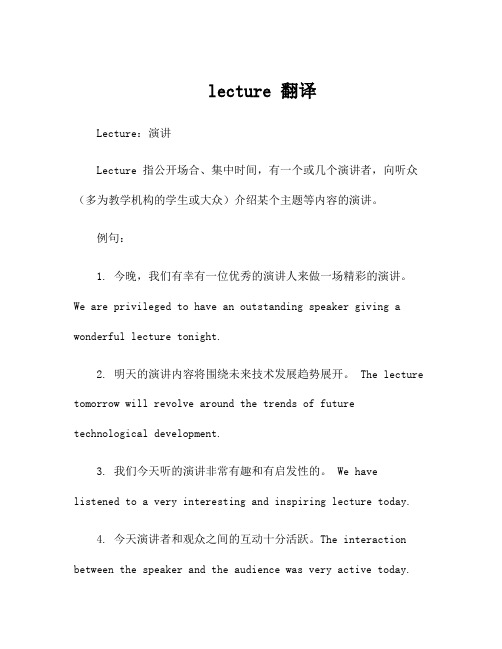
lecture 翻译Lecture:演讲Lecture 指公开场合、集中时间,有一个或几个演讲者,向听众(多为教学机构的学生或大众)介绍某个主题等内容的演讲。
例句:1. 今晚,我们有幸有一位优秀的演讲人来做一场精彩的演讲。
We are privileged to have an outstanding speaker giving a wonderful lecture tonight.2. 明天的演讲内容将围绕未来技术发展趋势展开。
The lecture tomorrow will revolve around the trends of future technological development.3. 我们今天听的演讲非常有趣和有启发性的。
We havelistened to a very interesting and inspiring lecture today.4. 今天演讲者和观众之间的互动十分活跃。
The interaction between the speaker and the audience was very active today.5. 这次演讲给我们带来了很多新的思考。
This lecture has brought us a lot of new thinking.6. 我们能够听到授课老师讲课时非常开心。
We were delighted to hear the teacher's lecture.7. 演讲带给大家很多新的想法。
The lecture brought a lot of new ideas to everyone.8. 我们应该积极主动参与演讲,发表意见和看法。
We should take an active part in lectures and express our opinions and views.9. 演讲者的精神赞扬和比喻使听众印象深刻。
lecture的意思

lecture的意思
"Lecture" 是一个名词,指的是一个口头演讲或教学活动,通常由一个专家或教师向一群学生或听众传授知识或信息。
Lecture 通常在学术环境中进行,如大学、学院或研究机构,也可以在其他场合比如会议、研讨会或商业培训中进行。
Lecture 的特点是由演讲者单向传递知识,学生或听众通常以被动接收的方式参与。
演讲者可能会使用幻灯片、视听材料或其他辅助工具来帮助讲解和理解。
Lecture 的目的是教育、启发和传授新的信息,通常会涉及特定学科的概念、理论、研究成果、案例分析等。
Lecture 的长度可以根据不同的情况而有所变化,从几分钟到几个小时不等。
有些大型课程可能由多个 lecture 组成,形成一个完整的课程或学期。
在一些教育环境中,lecture 可能会与小组讨论、实验室实践或作业相结合,以加深学生对所学内容的理解和应用能力。
Lecture 是一种常见的教学方法,有助于学生学习和思考。
然而,一些人认为 lecture 的效果有限,容易导致学生的被动接受和消极参与。
因此,在现代教育中,许多教育者也在探索和采用更具互动性和参与性的教学方法,如讨论、小组合作、案例研究等,以提高学生的学习效果和动力。
lecture 是一种教学活动,通过口头演讲向学生或听众传授知识和
信息。
它是传统的教学方法之一,可以在学术环境和其他场合中使用,旨在教育、启发和传达新的思想和理念。
lecture的名词

lecture的名词【释义】lecturen.讲座,讲课,演讲;训斥,告诫v.(尤指在大学里)开讲座,讲课;训斥,告诫复数lectures第三人称单数lectures现在分词lecturing过去式lectured过去分词lectured【短语】1Lecture Room百家讲坛;演讲室;教学室2lecture theatre大教室;阶梯教室;大讲堂;阅览室3lecture hall阶梯教室;大讲堂4The Last Lecture最后的演讲;最后一课;英文版5to attend a lecture听课;听讲6lecture notes讲稿;讲义;课堂笔记;教学笔记7attend a lecture参加演讲;听演讲;听讲座8Lecture Notes in Computer Science计算机科学讲义9He found my lecture interesting他觉得我讲课有趣;他觉得我讲课滑稽;他感觉我授课有趣儿;他感到我讲课有趣【例句】1I found her lecture very obscure.我觉得她的讲座非常费解。
2Can I borrow your lecture notes?我可以借你的讲稿看看吗?3She gave them a chastening lecture.她给他们做了一次令他们对自己的行为感到内疚的演讲。
4She wasn't taking notes on the lecture.她没记讲座笔记。
5She recast her lecture as a radio talk.她把讲稿修改成了一篇广播讲话。
6His lecture ranged over a number of topics.他的讲座涉及许多话题。
lecture6
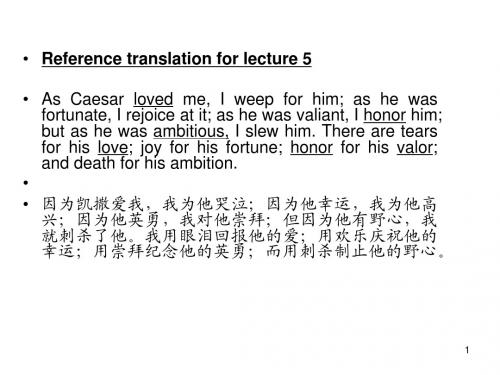
• Rockets have found application for the exploration of the universe. • 火箭已经发现为宇宙探索的应用。 • 火箭已经用来探索宇宙。
5
4 Types of Conversion
1. Conversion into Verbs 2. Conversion into nouns 3. Conversion into adjectives 4. Conversion into adverbs
19
• My point is that the frequent complaint of one generation about the one immediately following it is inevitable.
• 我认为,一代人对下一代人常常抱怨,这一点是 在所难免的。 • One of the leading newspapers called for the severest punishment of all who had been concerned in the conspiracy. • 一家主要报纸要求严惩所有与该阴谋有关的人。 • We are looking forward to the early arrival of our guests. • 我们期待客人早日到来。
17
• Other governmental activities are the responsibilities of the individual states, which have their own constitutions and laws. • 其他政府职能则由各个州来承担,各州 都有自己的宪法和法律。 • He looked on the Convention as a fair and faithful representation of the people. • 他认为这次大会公正忠实地代表了人民。
lecture用法及搭配

lecture的用法和搭配解析一、lecture的基本含义在英语中,lecture有两个主要的含义,分别是:讲座,讲课,演讲。
这是lecture的名词用法,指的是教育性或学术性的口头讲授,通常由专家或教师进行,目的是传授知识或观点。
例如:He gave a lecture on the history of art. 他做了一场关于艺术史的演讲。
I attended a lecture by a famous writer. 我参加了一位著名作家的讲座。
She is a professor who lectures on economics. 她是一位讲授经济学的教授。
教训,告诫,训斥。
这是lecture的动词用法,指的是长时间或严厉地责备或劝告某人,通常出于不满或关心。
例如:My parents lectured me for staying out late. 我的父母因为我晚归而教训了我一顿。
He lectured her on the importance of honesty. 他告诫她诚实的重要性。
She lectured him about his bad habits. 她训斥他的坏习惯。
二、lecture的词性和用法lecture可以用作名词或动词,具体的用法如下:lecture作为名词,是可数名词,其后可以接介词on或about,表示讲座或演讲的主题。
例如:He delivered a lecture on environmental protection. 他发表了一场关于环境保护的演讲。
She attended a lecture about Chinese culture. 她参加了一场关于中国文化的讲座。
lecture作为动词,可以是及物动词或不及物动词,具体的用法如下:lecture作为及物动词,表示向某人讲授,讲课,演讲,或者教训,告诫,训斥某人。
其后可以接名词或代词作宾语。
惯用法-lecture six(1)-过去分词

Lecture six(1)1 Struck stricken; Sunk sunken; drunk drunken; shrunk shrunken1.1 shrunk shrunken这一对词原来都是动词shrink的过去分词,现在只用shrunk作过去分词,而shrunken则用作形容词,它们都表示“收缩的”、“皱缩的”之意。
My hat has shrunk so much that it no longer fits me. 这顶帽收缩得很厉害,我戴不了啦。
My gums have shrunk. 我的牙龈已经收缩。
The doctor is examining the shrunken body of a starving child. 医生正检查小孩饿瘦了的身躯。
Facing high inflation and heavy taxation, the worker can hardly live on their shrunken wages. 面对高通涨及重税,工人难以以收缩了的工资为生。
1.2 Struck strickenStruck用于一般打击、撞击、刺激,如:They were struck by lightning. 他们遭雷打了。
I was struck with a wonderful idea.我忽然间想起了一个很好的主意。
The students were struck by the determination of their principal.学生们深为他们校长的决心而感动。
She was struck with pity for the old man.她对那老人动了怜悯之心。
Their eyes were struck by the awesome beauty of the landscape.令人叹为观止的美丽风景把他们慑住了。
Stricken指受打击,受煎熬,较struck富感情色彩The poor are struck most by the ever-increasing housing costs.穷人受不断上涨的楼房费用打击最大。
- 1、下载文档前请自行甄别文档内容的完整性,平台不提供额外的编辑、内容补充、找答案等附加服务。
- 2、"仅部分预览"的文档,不可在线预览部分如存在完整性等问题,可反馈申请退款(可完整预览的文档不适用该条件!)。
- 3、如文档侵犯您的权益,请联系客服反馈,我们会尽快为您处理(人工客服工作时间:9:00-18:30)。
会谈笑风生,问题是要碰到她们高兴的时候;她们 也不是不会待人和颜悦色,问题在于她们是否乐意 这样做;可惜的是,她们一味骄傲自大
• The fan,with its modern,elegant,bright,and harmoniously colored design,is an excellent electrical household appliance for cooling purposes on hot summer days.
• 老人说,“听人说,从前他爸爸是个打鱼的。
他过去d never thought I’d be happy to find myself considered unimportant. But this time I was.
以往我从未想过,当我发觉人们认为 我是无足轻重时,我会感到高兴。但 这次情况确是如此 。
• 3The magistrates are free to burn down houses while the common people are forbidden even to light lamps. (One man may steal a horse while another may not look over the hedge.) • 4上班,做家务,交朋友,(这些)占用了我的全部时间。
After-class assignment
1. 这个小男孩饭前都洗手,然后用餐巾纸擦干。 2. 交出翻译之前,必须读几遍,看看有没有要修 改的地方。这样你才能把工作做好。 3 只许州官放火,不许百姓点灯。 4.My work,my family,my friend are more than enough to fill my time. 5.To err is human,to forgive divine.
Eight translation techniques 1.增译法(amplification); 2.重译法(repetition); 3.减译法(omission); 4.词类转移法(conversion); 5.词序调整法(inversion): 6.分译法(division); 7.正说反译,反说正译 (negation); 8.语态变换法(the change of the voices)
气助词”添词
虚心使人进步,骄傲使人落后。
• Modesty helps one to go forward,whereas conceit makes one lag behind.
跑了和尚跑不了庙。
• The monk may run away,but the temple can’t run away with him.
• 6 A fool and his words are soon parted;a man of genius and his money. • 7 One cannot learn to produce a sound from an explanation only,or get a correct idea of a flavor from a description:a sound must be heard,a color seen,a flavor tasted,all odor inhaled. • 8 Now, I had to become a miser with words and stretch every sentence like a poor man spending his last dollar.
• 根据我们的记录,贵公司过去购买我们的化工产 品的数量相当可观,可惜近年来业务一度中断了。 • Man,was,is and always will be trying to improve his living conditions.
• 人类过去、现在而且将来总是在尽力改善生活条 件。
• Was as poor as we are. Had never thought has been moved…采用“语法时间状语或语
• 本电扇款式新颖,造型雅致,色彩鲜艳,色泽调 和。是炎炎夏日消暑纳凉之家电精品。
Question for thought
• What is the purpose of using amplification in translation? • A) to make the version natural and fluent • B) to achieve rhetoric effects • C) to adequately render the original meaning
•
• 5 犯错乃人之常情,宽恕乃神之圣行。
• 6愚人会很快忘记说过的话,智者会很快放弃手里的 钱。 • 7人不能只从讲解中学会发音,也不能光靠看说明而 真正体会出某种滋味来:声音必须耳闻,颜色必须 目见,滋味必须口尝,气味必须吸入.
• 8我决定对词汇要像守财奴那样不轻易放过;也要像 穷人过日子,把每个句子当做身边最后一块钱,尽 量拖延,慢慢花掉。
• 1 The little boy always washes his hands before meals and then dries them with napkins. • 2Before handing in your translation,you have to read it over and over again and see if there is anything in it to be corrected or improved.Only thus can you do your work well .
你再想想我的汽车修理师吧。他有个习惯,每 次见到我都要跟我讲些笑话。
增补表示复数概念的词 。 。 。。 。。
Grammatical amplification
The old man said, “They say his father was a fisherman. Maybe he was as poor as we are.”
留得青山在,不怕没柴烧。
• So long as green hills remain,there will never be a shortage of fire-wood.
• 增补连词。。。。。。。
Rhetoric amplification
They were, in fact, very fine ladies; not deficient in good-humor when they were pleased, nor in the power of being agreeable when they chose it; but proud and conceited
这个会议室有四大优点:明亮、宽敞、时髦、无 回声。
The Americans and the Russians have undergone series of secret consultations.
美俄双方已进行了一系列的秘密磋商
Henry Kissinger had slept there before, in July and again in October.
这之前,基辛格在7月和10月两度在那里下榻。
• 增补概括性的词…….
His diligence,earnestness,carefulness and brilliance make him praised by all.
他勤勉、踏实、细心、才华过人,这些优良品 质使他受到众人的夸奖。
Mr Hobbs didn’t talk over my suggestions with his brother until yesterday afternoon. • 直到昨天下午霍布斯先生才跟他兄弟讨论 了我的各项建议。 Consider my auto-repairman,again.He had a habit of telling me jokes whenever he saw me.
A ring road lies on the site of an old city wall which has been moved.
旧的城墙已经拆掉,原来的墙址上修了一条环城 马路
• According to our record,your corporation bought substantial quantity of chemicals from us.Unfortunately the business between us • has been interrupted in the last few years. •
类似词汇如: arrogance, indifference, tension, confusion, solution, remedies, jealousy, faultfinding
• The advantages of the meeting room are bright, spacious, fashionable, and without echoes.
Group competition
1.I am looking forward to the holidays. 我在等待假日的到来. 2.Much of our morality is customary. 我们大部分的道德观念都有习惯性。 3.Courage in excess becomes foolhardiness, affection weakness,thrift avarice. 勇敢过度,即成蛮勇;感情过度,即成溺 爱;俭约过度,即成贪婪。
(1) Amplification 增译法
Three types: Semantic amplification Grammatical amplification Rhetoric amplification
